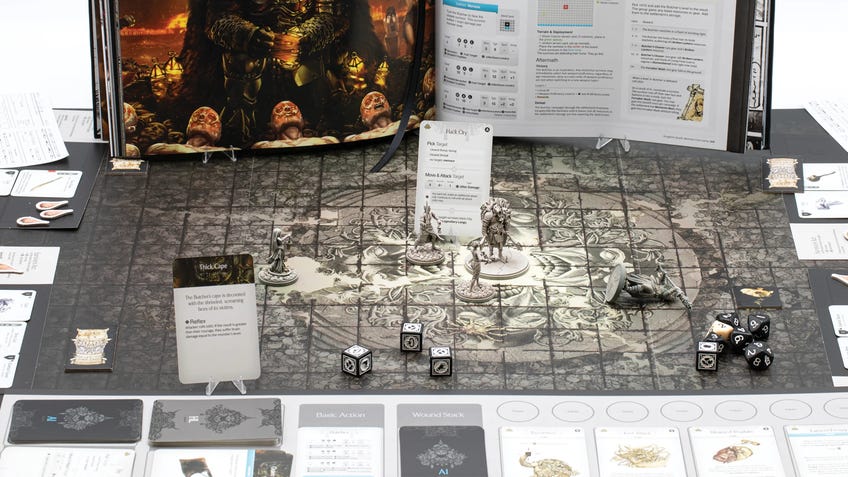Kingdom Death’s seven-year journey to overcome COVID, fear of irrelevance and the Monster promises of its record-breaking Kickstarter
“Tabletop is the only way of gaming I can think of that exists on this additional plane of consciousness.”
The Kingdom Death experience is organised chaos. Since the long-awaited Gambler’s Chest expansion for the nightmarish boss-battler arrived at my door last month, my lounge has been a blizzard of tokens and terrain tiles, miniatures and mechanical pencils, sourcebooks, clipboards and card decks. It’s an energy that seems to come all the way from the top, but I suppose it doesn’t help that I’ve called creator Adam Poots at Kingdom Death’s busiest time of year: the post-Halloween, pre-Black Friday sales window.
It’s almost lunchtime in New York, and “It’s chaos right now,” says Poots. “You open the door and there’s a massive packroom where people are packing the orders that come in from day-to-day sales. Past that there’s a huge table where people are inspecting and cleaning 3D prints to get ready for packing.” Further on sits office space where team members handling warehouse and logistics work next to suites where engineers tool away on hard plastic and 3D printed models. (“Two very different roles that go through the same piece of software.”)
Beyond all this sits Poots’ office, the first he’s had in his time at Kingdom Death. “At one point there was 30 of us all working in a single 1,000-square-foot space. Elbow-to-elbow, bullpen style,” with Poots himself at a work desk that also housed his paint station and gaming PC. He’d take a break to play Deep Rock Galactic with friends, and then suddenly leave his team in the lurch while work grabbed his attention.
The office - or rather, the space outside of it - gives him a chance to switch off. But the lead-up to Black Friday - where Kingdom Death’s pricey minis see huge reductions - is always hectic, to the point where all design work is on pause while logistics take centre stage. “Halloween's kind of a cursed sale for us,” Poots says. “There’s always something that goes tragically wrong. This year one of the cards we got from our manufacturer didn’t have its corners rounded so we couldn’t pack it - now we’re desperately waiting for reprints to show up so we can get on with things!”
“It’s easy to forget how many moving parts there are,” he admits, though he’s quick to point out that this won’t mean delays. Given the past half-decade, I can’t blame him for wanting to clarify.
When Kingdom Death’s 1.5 Kickstarter, a follow-up to its original 2012 run, ended on January 7th 2017 - its $12.39 million making it the most successful tabletop project in the crowdfunding site’s history until Frosthaven took the crown in 2020 - the Gambler’s Chest was a bonus box full of disparate game elements; a KD-ified miniature homage to Berserk’s Guts here, a jaunty child-eating Santa there, a few peripheral expansions. Every day, Poots would roll a d100 and add a corresponding stretch goal to the collection.
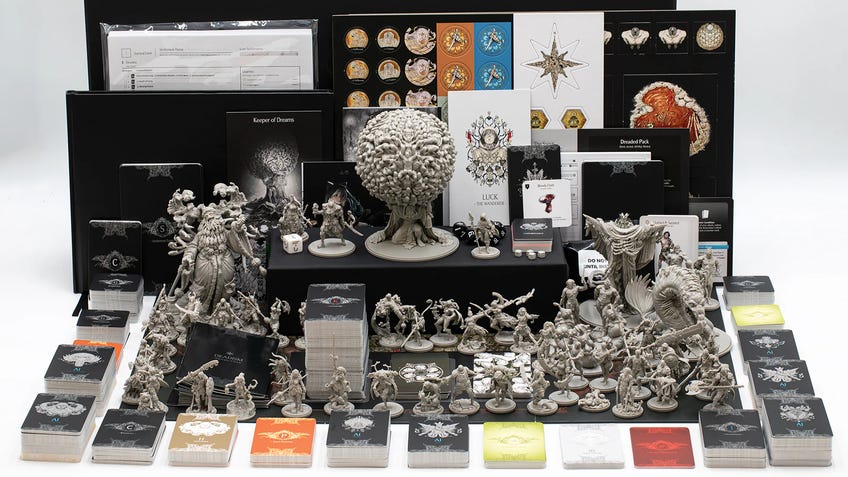
The chest was just one reward among dozens, but what neither the team nor over 19,000 backers could have predicted at the time is that this one reward would not only bloom into an effective sequel to the core game, but take the better part of seven years to fulfil.
“We felt like we had basically Kickstarted five years’ worth of work, and had to grow to accommodate that. Hiring, training, onboarding, managing, all that stuff,” Poots recalls. “I started working in earnest on the Gambler’s Chest - the actual design - the next year.”
Every day, Poots would roll a d100 and add a corresponding stretch goal to the collection.
While Adam reorganised the team, the early stages of design fell to Kingdom Death’s secret weapon: Anna Poots.
Anna, Adam’s wife, made the decision early on to stay out of the public eye, yet it’s clear from talking that she’s as vital to Kingdom Death as he is. Ask Adam about the genesis of the project, and he speaks in first-person, but when he talks the big-picture stuff - the world-building, the monsters, the soul of the project - it’s always “Anna and I”.
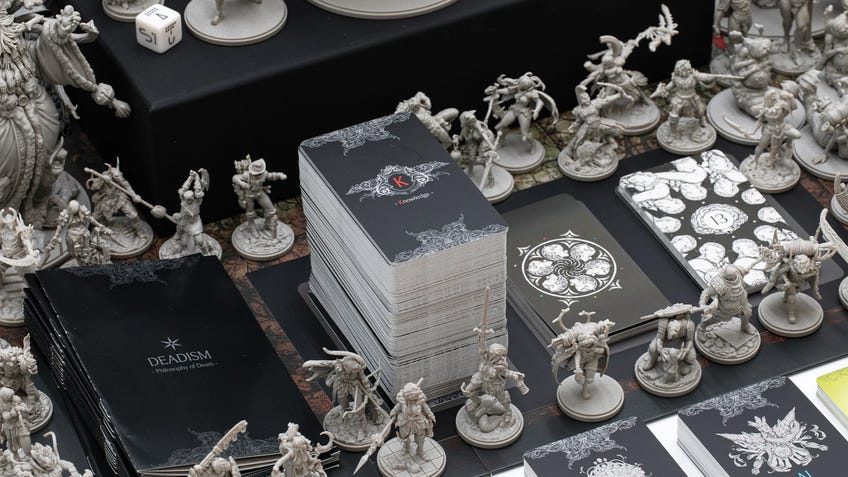
After early design and a year of playtesting, “we finally got to 2019, and that’s where Anna and I sat down. We have a tremendous amount of work done on everything, but nothing is finished and now we’re stressing out. I had all these notes, all these meetings. At that point, I was like, ‘Okay: this is its own expansion.’ Once the individual pieces were developed enough, it only made sense to use them to tell a part of the story that had been evolving. One advantage of working on everything at once is that it enriched the world so tremendously.”
By this point in its development, Poots says the Gambler’s Chest had become, to him, the real promise of the Kickstarter. The headline 1.5 update had been fulfilled, along with scores of bonus miniatures, but tackling the Gambler's Chest next meant that backers who’d pledged thousands on a whole new wave of expansions back when the chest was just a side dish were waiting around with empty hands. But Poots didn’t want to take all the work done already and end up with a “kitchen sink product”.
“I wanted it to be more core to the experience, to make sure it not only met our standards but, also, we were the number-one Kickstarter - the pressure to make something bigger than we had ever made before was so real. I think most people would have taken the money and made something that was, you know, fine. But I felt like for it to be truly genuine, it had to come from deep, deep within... for better or worse.”

In the same way, Kingdom Death: Monster came from a much simpler place: Poots just wanted to make something his gaming group would have fun with. One scrapped dungeon-crawl-style project later (“That was just what not to do!”) and the seeds of Monster started to emerge.
The pressure to make something bigger than we had ever made before was so real.
The biggest leap from that doomed first project to Monster was the move away from what Poots calls ‘spotlight gameplay’, which “is where dungeon-crawlers sit”. One person resolves a complex turn, everyone else waits.
“Not only do you spend more time not playing a dungeon-crawler, you’re also filling a table with things that have less meaning the longer you go. I was thinking about how to change the focus of the spotlight from an individual person over to a moment. And led to the idea of the singular boss fight and making the deck of cards that would be the sole focus, so at any moment this deck of cards could drastically change the tides.”
Monster’s other famous hallmark, its difficulty, arose from that same desire to keep his group engaged. “Many dungeon-crawlers we were playing at that point were a cakewalk. Sort of like a long car trip - the only danger is if you’re so bored you kind of drive off the road. We wanted it to feel dangerous and exciting. As old-school gamers, losing is how you learn. If there’s no Game Over, how do you value things?”
My current campaign has seen one of my survivors pick up a ‘knowledge’, or ability, called “Fingernail Door”. Every time you roll a ten, the card says, physically rotate that die to a one. Each time, my character gets a little closer to a new knowledge, and we both go a little more insane. Tens are incredibly precious in Monster. I could just as easily leave the survivor at home, but Kingdom Death has primed me to know that something equally ridiculous awaits me if I just press on.
“That’s what makes tabletop so cool!” says Poots. “You have this mixture of storytelling, immersion and gameplay mechanics, and they all combine to make this sort of imaginative narrative. Tabletop is the only way of gaming that I think of that exists on this additional plane of consciousness. You’re not playing a video game and also having a rich imagination that’s also shared between people if you’re playing as a group. To me, that’s so endlessly enamouring.”
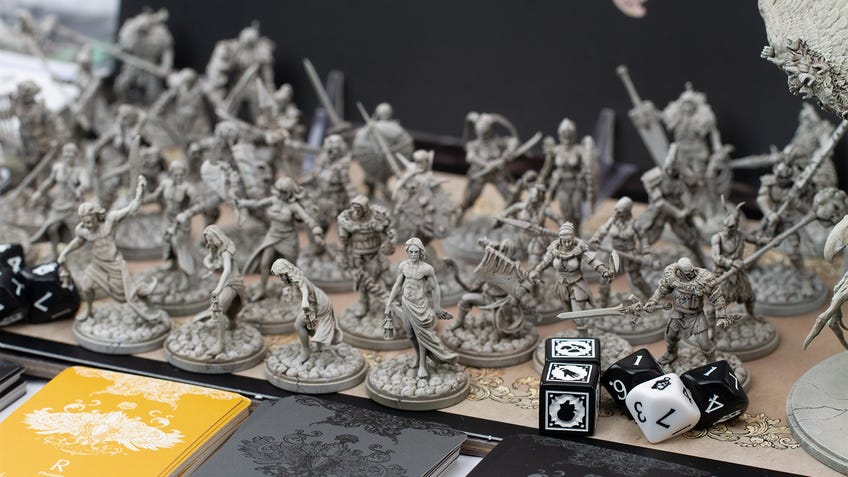
By the end of 2019, “it felt like we were really getting back on track. Anna and I were back to designing.” The Crimson Crocodile - the first monster you’ll face in the new campaign - felt like an embodiment of that; “Having this monster that could be really powerful but is held back by its own hubris was such a fun thing to work on.”
But 2019 would give way to 2020. As Poots puts it: “COVID fucked us. But that’s not how everyone will remember it, unfortunately. Instead of being on year four of a five-year project, everyone was like: ‘You’re on year seven! What’s going on?!’”
COVID fucked us. Instead of being on year four of a five-year project, everyone was like: ‘You’re on year seven! What’s going on?!’
Look at the Kickstarter updates from this period, and you’ll see - among Poots’ trademark enthusiasm and spelling errors - shipping container estimates ballooned to millions and, later, containers backed up in rail yards.
It’d be a neat story to pretend the Gambler’s Chest finally rose triumphantly, against the odds, and all was right with the world, but as promised completion turned into manufacturing, shipping and eventually fulfilment, it felt more like a slow but determined lurch through a mire of mixed emotions from backers ranging from weariness to distrust, ever lit by the soft lantern glow of hope that the intervening years had been time well-spent. Poots and the team had delivered on their promises with gusto, but this promise was just one of many more.
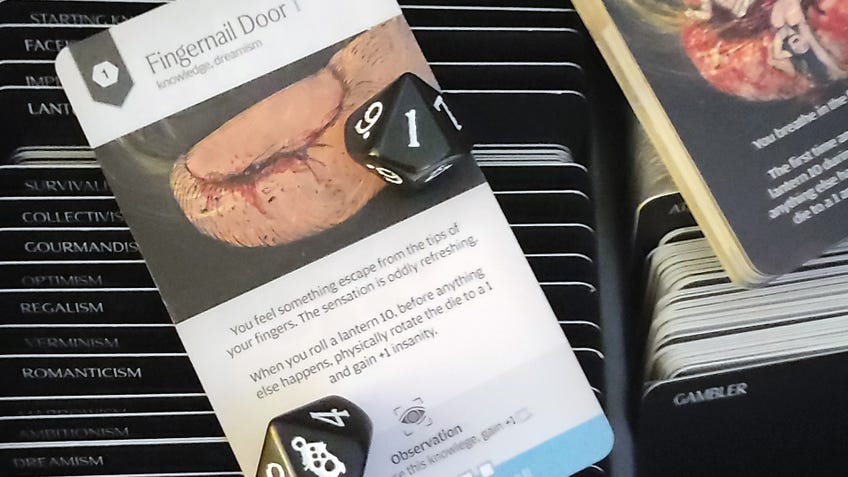
For Poots, it took until this summer’s Gen Con for any feeling of completion to actually set in, although even that took a few days. He was terrified that Kingdom Death was wasting its time there, especially since the US tabletop convention costs them around $100,000 to attend. “There’s this fear at the business end. We haven’t been here since 2019. Are enough people going to care?”
In the end, though, he needn’t have worried. A post-Gen Con Kickstarter update shows fans decked out in Kingdom Death: Monster cosplay. It was, says Poots, “a very touching and surreal moment". They weren't alone; "It was what happened after that I had no expectation of - the new fans! I’ve been so focused on existing fans and backers that I haven’t been focused on new people coming to this.”
Kingdom Death is not a product by a company; it continues to be a dream that we have crystalised.
The team left Gen Con having sold every core game they’d brought along. For now at least, it seems Poots’ self-confessed ridiculous standards are still winning over new fans. Does he see things differently, compared to the last time the team were there four years ago?
“Kingdom Death always has, and has continued to be, a baby that we hold very close to our chest. It’s not a product by a company; it continues to be a dream that we have crystalised. So the lesson I wish I had known is that building the right team is more important than having the workforce to complete something. Anna and I created this and, as far as we’re concerned, we’re regular people. So from our point of view: anyone can do this, they just need to work hard and have drive and learn. And maybe some of that is true, but if it’s a soul project, you need to resist the urge to grow and stay true to yourself.”
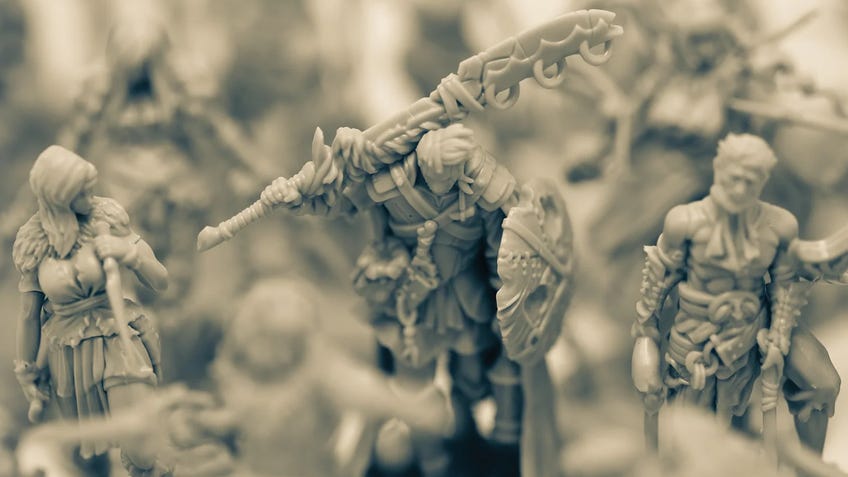
Early in our conversation, Poots laments somewhat that he’s become the face of Kingdom Death as a brand - a literal James Workshop. “At times I wish I just had a director credit and that’s it. Adam Poots is not that important to Kingdom Death anymore, really... as far as the ego, vanity, is concerned.”
In the halcyon days of Kickstarter, the idea of the individual with the dream was very much part of the crowdfunding experience. What followed seems to have been a combination of accident and necessity, although the designer jokes that having ‘I (heart) Poots’ stamped on the bottom of the miniatures may have been a factor.
“At a certain point... we made KD. People enjoyed it. That was kinda like ‘We did it.’ At that point, my ego could never again be the size of Kingdom Death. It’s now far bigger than me.”
This article has been updated to clarify the additional Kingdom Death: Monster 1.5 Kickstarter rewards that were fulfilled prior to the completion of the Gambler's Chest expansion.
Buy Kingdom Death: Monster from publisher Kingdom Death (US) or Zatu (UK).
